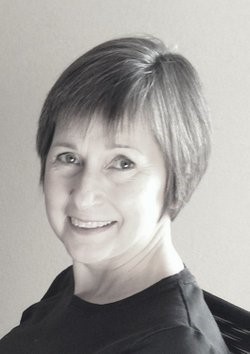 Marianne had always dreamed of becoming an author. It took an encounter with an elderly couple, in her capacity as a nurse, to help her complete her first novel, Blue Hydrangeas
Marianne had always dreamed of becoming an author. It took an encounter with an elderly couple, in her capacity as a nurse, to help her complete her first novel, Blue Hydrangeas. She is now working on her second.
Tell us a little about your background…
I’m not a nurse who writes, but a writer who happens to be a nurse. A lover of words and books, I dreamed of becoming an author when I grew up but became a nurse to avoid poverty. It seems as though I’ve been writing ever since I could make letters. As a child, I fell in love with books and yearned to create my own, to one day see my name on its cover as author, to find it on a library shelf or in a bookstore, to catch someone reading it.
My dad, a cabinetmaker, was a book lover and filled our home with books. We had a beautiful bookcase in our living room, built right into the wall, and he stocked it with all kinds of books, most of which I was too young to read. He made up for it by bringing me to the library every week and letting me check out as many books as they’d allow. This inspired me at an early age to someday write my own book. Unfortunately, Dad passed away when I was fifteen and did not get to witness my success.

In 5th grade
I grew up in Brockton, Massachusetts. In high school, I dreamed of becoming a reporter—a foreign correspondent, at that—and in college I worked as a reporter for my college newspaper at the University of Massachusetts at Boston. In my spare time, I worked as a stringer for several local newspapers. I thought that with hard work, determination, skill, and talent, I would see my dream come true. That did not happen.
Fresh out of college with an English degree, I was unable to secure stable employment as a reporter. I struggled for a couple of years, but eventually grew desperate because I was broke and had to support myself and pay off student loans. I then took a job with a national non-profit health agency and freelanced on the side as a reporter and as a production assistant for some small papers, all in Massachusetts. These jobs proved unsatisfying, and I drifted into other jobs and finally gave up writing and reporting for good.
This happened in the late ‘80s, early ‘90s, when the US was in the midst of a nursing crisis. I’d never thought of becoming a nurse, in fact, I balked at the idea when my high school guidance counselor suggested it in high school. But as an adult, I realized nursing might provide an opportunity for me to gain stable employment. I had just met my future husband in 1990 when I decided, at the age of 29, to completely switch career paths and go into nursing. I relocated to upstate New York to pursue this new romantic relationship and enrolled in a Licensed Practical Nurse (LPN) program at Orange-Ulster BOCES, a technical-vocational school in Goshen. This was a full-time endeavor and I also worked part-time as a nursing assistant in a skilled nursing facility. Upon graduation, I was fortunate to be offered a hospital job and worked on a geriatric medical unit. I married that New Yorker and less than two years later had my first and only child, a daughter.

With my parents, nursing school graduation, 1992
I enjoyed my job in the hospital but it didn’t take long for me to realize that any career growth or opportunities required licensure as a registered nurse, so I enrolled in the Regents College external degree program in Albany to earn an Associate in Applied Sciences. I graduated in 1998, passed the state boards, and began working as an RN in the same hospital. I preferred to be a “float” nurse, which meant I travelled from floor to floor, day after day, working with all kinds of different patients: medical-surgical, geriatrics, pediatrics, rehabilitation, oncology, you name it. My Bachelor’s degree in English opened a few doors for me, and I tried out a number of specialty positions such as continence care nurse, nurse educator, and case manager.
When did you start to think about making a change?
After I’d worked as a hospital nurse for a few years, one of the nurse managers started a newsletter for our department. I volunteered to help and soon I was running the whole thing! This project reignited my desire to write, and I started penning articles, one of which a nursing journal published.
I had dreamed of writing a book all my life and had made several starts over the years but never finished anything. I had a lot of ideas but lacked the discipline to complete a project. One day I was at the gym and wanted to read something while I worked on the treadmill. I picked up the latest copy of Good Housekeeping magazine. Inside I found an excerpt from the latest Elizabeth Berg novel, True to Form. I read the whole thing while my legs got a lengthy workout. The next day, I went to the library and checked out the book. After reading this and every other book she wrote, I knew hers was the type of book I wanted to write.
This happened shortly after the terrorist attacks on September 11, 2001, and a near-drowning experience earlier that same summer. These events left me with an increasing sense that I had no guarantee of time: If I wanted to achieve my goal of writing a book I needed to get serious, sit down, and do it.

What is your next act?
I am a novelist. My next act is to find success as an independently published author. I self-published my first book, Blue Hydrangeas an Alzheimer’s love story, on Kindle, in April 2013. I was 52. I followed that with a paperback edition in September 2013 and an audiobook in 2014. Blue Hydrangeas
is the sad but beautiful story of a pair of retired Cape Cod innkeepers struggling with the wife’s Alzheimer’s.
The response to the book has been tremendous. At first, I did not know what to expect or whether it was any good. Soon after publication, I started to receive emails and letters—as well as reviews posted on Amazon and Goodreads—from people who thanked me for writing such a beautiful, accurate story of life with this disease. The bulk of the praise came from caregivers, an audience I did not think would have any interest in reading a book that mirrored their daily lives. But I was so wrong, as this has turned out to be my target audience. I am humbled by their praise and honored to serve as a conduit for them to express their own stories via their reviews of my book. I’ve been invited to speak at my local Alzheimer’s Association’s annual education conference and did a book reading for a book club at a local skilled nursing facility. This has been a wonderful experience
I’ve also published two short stories on Kindle, Ino’s Love and Collection, and am currently working on another full-length book, Swim Season, a Young Adult sports novel about a girls’ varsity swim team (sneak peek here.)
So, although I love being a nurse and it has been a rewarding career for me on many levels, I am at heart a writer. This will always be how I define myself.
Writing has always been how I best express myself. I love playing with words, cleaning up text, debating over one word or another. I also love to tell stories, real stories, but also those that erupt in my mind, usually unbidden, with screaming characters who won’t let me rest until I jot down at least an outline of what they want me to tell the world. It’s both a gift and a curse.
Writing has taught me the limitless depths of my imagination, my desire to perfect my craft, my dedication to completing a project no one requires of me, and my unwavering belief that I have something wonderful to offer the world.

How did you finally complete and publish your first novel?
It took 11 years. Writing “The End” on the last page of Blue Hydrangeas was one of the greatest achievements of my life. Those who have written or attempted to write a book know what I mean. It was an indescribable feeling of joy and accomplishment.
Here’s how I met the couple who inspired the characters in Blue Hydrangeas. It’s a great story: While at work as a nurse case manager in a rehabilitation unit, I met a captivating elderly couple. She had Alzheimer’s and he was physically frail. The amazing thing about them was that they’d driven from Florida to New York by themselves without any incident. Unfortunately, once home, she fell and broke her pelvis and landed in the hospital. That’s where I came in, to assist with the discharge plan. She was supposed to go to a local nursing home for continued rehab and her son planned to drive her and her husband there on discharge day. I completed their plans and said goodbye, but couldn’t stop thinking about them, wondering what would happen if they somehow left the hospital without their son and did not go to the rehab. Where would they go? What would they do? My wild imagination took off, and the seeds for the novel took root. Eighteen months later, I had a complete manuscript.
When I embarked on this adventure in publishing, I had no idea what I was getting into and set about educating myself. Thankfully, I’m a quick learner and have managed to achieve some semblance of success in the last two years. I considered traditional publishing but the gatekeepers wouldn’t let me in! After years of writing query letters and collecting rejection letters I gave up. When a friend suggested I publish on Kindle I figured I had nothing to lose. Let the readers decide, I thought, and the readers decided they liked my book.
I love indie publishing because it allows me to write what I want to write, at my own pace, and in my own way. I control every aspect of the process and my product. Unlike traditional publishing, where a big publishing house enters an arrangement with an author to publish her work, independent publishing is a solo show, where the author is in charge of every aspect of turning a manuscript into a polished, presentable book and launches it into the literary marketplace. There are no editors, cover designers, publicists, or marketers to help. The author is total do-it-yourself, responsible for finding the right professionals to provide service as needed and for all costs associated with completing the work. It is a long, hard, painstakingly arduous endeavor that is both terrifying and satisfying.
I now teach classes in self-publishing at two colleges: Adventures in Publishing – How to Independently Publish Your Own Book and Write Release Retail – How to be an Indie Author. Here are the links to my upcoming classes and appearances.

Presenting Blue Hydrangeas at Belle Reve Senior Living Center Book Club
How supportive have your family and friends been?
Family and friends are very supportive, especially my mom, because she knows this has been my lifelong dream. People who are book lovers are more supportive than others because they value the work. Too many people place little value on the amount of time it takes to write, publish and market a book, and to build the social media platform required to generate discoverability and sales. Still, some people have surprised me by telling their friends and coworkers about my book and generating sales. I’m sure my husband and daughter would prefer I’d found another hobby because this is all very time-consuming, and of course my mind is always somewhere else.

Playing bingo with my mom
What challenges have you encountered?
I didn’t realize what the challenges would be when I started out. Publishing my book on my own was no easy task. I knew nothing about formatting a book, creating a cover, building a platform, etc.
To add to the difficulty, I live with a number of repetitive strain injuries, including tendinitis, bursitis, carpal tunnel syndrome, and thoracic outlet syndrome (read more about that here and here). These conditions cost me my full-time job as a hospital nurse case manager in 2007 and limit how much time I can spend on the computer. I now work just two days a week as a campus nurse at a community college. My writing is very slow going, and I sometimes collapse in pain and frustration as I try to complete a manuscript or project.
I am, by nature, a stubborn person and a perfectionist, but finally realize I need help. I found a formatter who works quickly and inexpensively. I hire cover designers and graphic designers to help with promotional pieces. I offer a practicum to arts and communications students at the college where I work and teach them the nuts and bolts of indie publishing while they help me with the tedious painful keyboarding. This relieves a lot of the stress and strain.
I also struggle with other challenges that are not health-related. At the top of the list is money. It costs a lot to publish and promote a book. Marketing is never ending and advertising is ongoing. Sometimes the return on investment is not there. I find myself broke most of the time. My computer crashed last summer and I had to replace it, which ate up a big chunk of my budget for my next book.
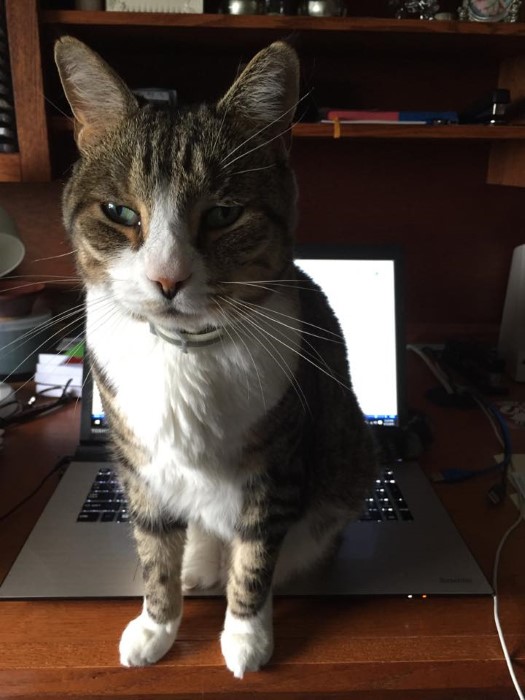
My muse, Mr. Chance
Were there times when you thought about giving up?
I think about giving up every single day. Sometimes it just doesn’t seem worth it. But the people who live in my head won’t let me give up, and the readers who write to tell me how much my work means to them inspire me to go on. It’s a one day at a time kind of thing. If I need a break, I take it. Some days are better than others, more productive, more rewarding. Some days stink. But when I try to think of something else I’d rather be doing, my mind goes blank. This is my life’s dream and I’m living it.

Promoting my books at St. Josephs Church Christmas Bazaar
Looking back, is there anything you’d have done differently?
If I knew how physically painful this would be, and how mentally draining that pain would be, I would not have embarked on this wild adventure.
What advice do you have for women seeking reinvention in midlife?
It is never too late to follow your dreams. When we’re older we have more insight, more life experience, more guts, and more money to do those things we always dreamed of doing. There is always a new adventure, new ideas, new goals and challenges. As we enter midlife we have more time for ourselves and for our own interests. Take advantage of that time. Be good to yourself.
What advice do you have for those interested in pursuing fiction writing and self-publishing?
Do your research. Independent publishing is not for the feint of heart. It’s hard work. You’re on your own, accountable to no one but yourself, and have to make your own decisions. You will need to develop a number of new skills. It’s imperative you reach out to others. There’s a wealth of camaraderie, support, caring, and sharing of know-how and information in the indie author world. You will also need to develop a thick skin as not everyone will love or appreciate your work and some delight in telling the world what they think of it.

My eclectic library
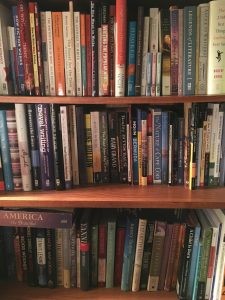
What writing/publishing resources do you recommend?
Books
Stein On Writing: A Master Editor of Some of the Most Successful Writers of Our Century Shares His Craft Techniques and Strategies by Sol Stein – classic advice
How to Grow a Novel: The Most Common Mistakes Writers Make and How to Overcome Them by Sol Stein – classic advice
On Writing: A Memoir of the Craft by Stephen King – classic advice
Write In Style: How to Use Your Computer to Improve Your Writing by Bobbie Christmas – required reading for editing your work
APE: Author, Publisher, Entrepreneur-How to Publish a Book by Guy Kawasaki – everything you need to know to start indie pubbing
The Art of Social Media: Power Tips for Power Users by Guy Kawasaki and Peg Fitzpatrick – the nuts and bolts of social media
Twitter for Authors: A Busy Writer’s Guide by Marcy Kennedy – the how-to manual for Twitter
Podcasts
I love podcasts and there are a number of them dedicated to helping aspiring authors:
The Creative Penn, Joanna Penn
The Bestselling Fiction Podcast, Dan Dynneson
Rocking Self-Publishing Podcast, Simon Whistler

Facebook Groups
Websites
The Creative Penn, Joanna Penn
CreativeIndie, Derek Murphy
Conferences
uPublishU at Book Expo America, America’s biggest book event
Indie Author Fringe, an online conference
Publishing Services and Tools
Perry Elisabeth Design, book covers and formatting
Heather McCorkle, Book Covers and Graphic Design
A Darned Good Book, eBook Formatting
Create Space, editing services
Bobbie Christmas, the Book Doctor, for advice and how-tos
Clean Indie Reads, supportive online group for authors of clean, independently published fiction
Ereader News Today, online book advertising
BookWorks, The Self-Publishers Association
IndieReader, a venue for discriminating book-lovers to find and purchase books published by the people who wrote them

AlzAuthors founders
What’s next for you?
Right now I’m collaborating with three other authors of Alzheimer’s books to launch AlzAuthors, a new blog dedicated to providing resources for those concerned with Alzheimer’s and dementia. Each day in June, Alzheimer’s and Brain Awareness Month, we feature a different author writing on the subject. Most of them are caregivers who share their personal stories as well as advice for those on their own journey. Some have written books. Others are bloggers. We are making a positive impact in the Alzheimer’s community.
Speaking of dementia, I recently became responsible for a loved one diagnosed with three types: Alzheimer’s, vascular, and frontotemporal. He was admitted to a residential facility in a locked memory care unit. So I have become a character – David, the son – in my own book. One of life’s little ironies. Thankfully, my experience as a nurse and Alzheimer’s advocate has provided me with a solid background for navigating these issues, but then no one is ever prepared, are they? It’s a lot harder than I imagined.
In the midst of all of this, I continue writing, publishing, and promoting my work, and building my brand as an author. Each day brings a new idea, opportunity, or invitation. I’m working on finishing and publishing my second book, Swim Season, a Young Adult novel about a girls’ varsity swim team, inspired by my 10 years as a Swim Mom. (Here’s a preview.) I plan to publish later this year. In fact, I will not rest until I hold that book in my hands. It has been four years in the making and has come at considerable personal cost in pain and suffering, much more so than my first novel.
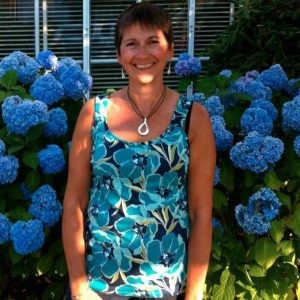 Contact Marianne Sciucco at MarianneSciucco@gmail.com
Contact Marianne Sciucco at MarianneSciucco@gmail.com
Watch an Interview with Author Marianne Sciucco
My book links
Amazon: Blue Hydrangeas
Amazon UK: Blue Hydrangeas
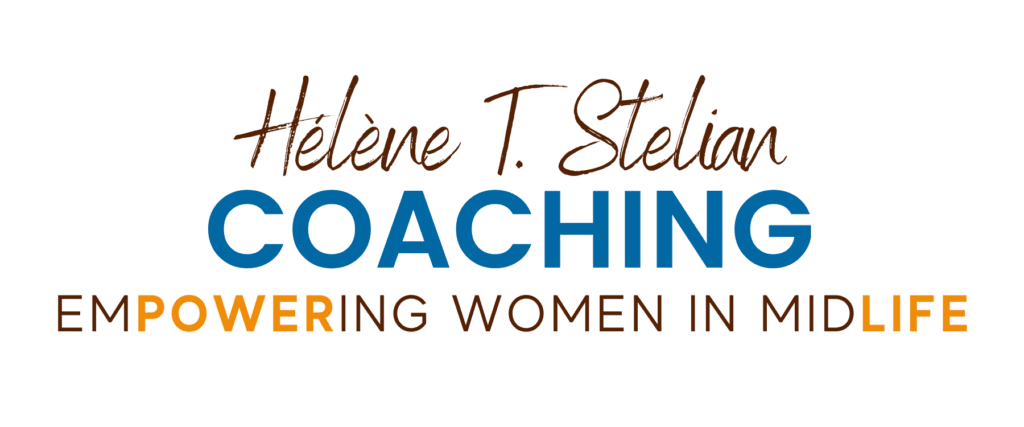

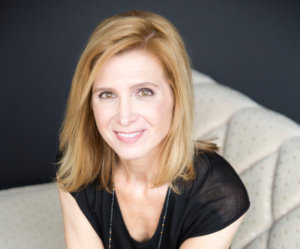
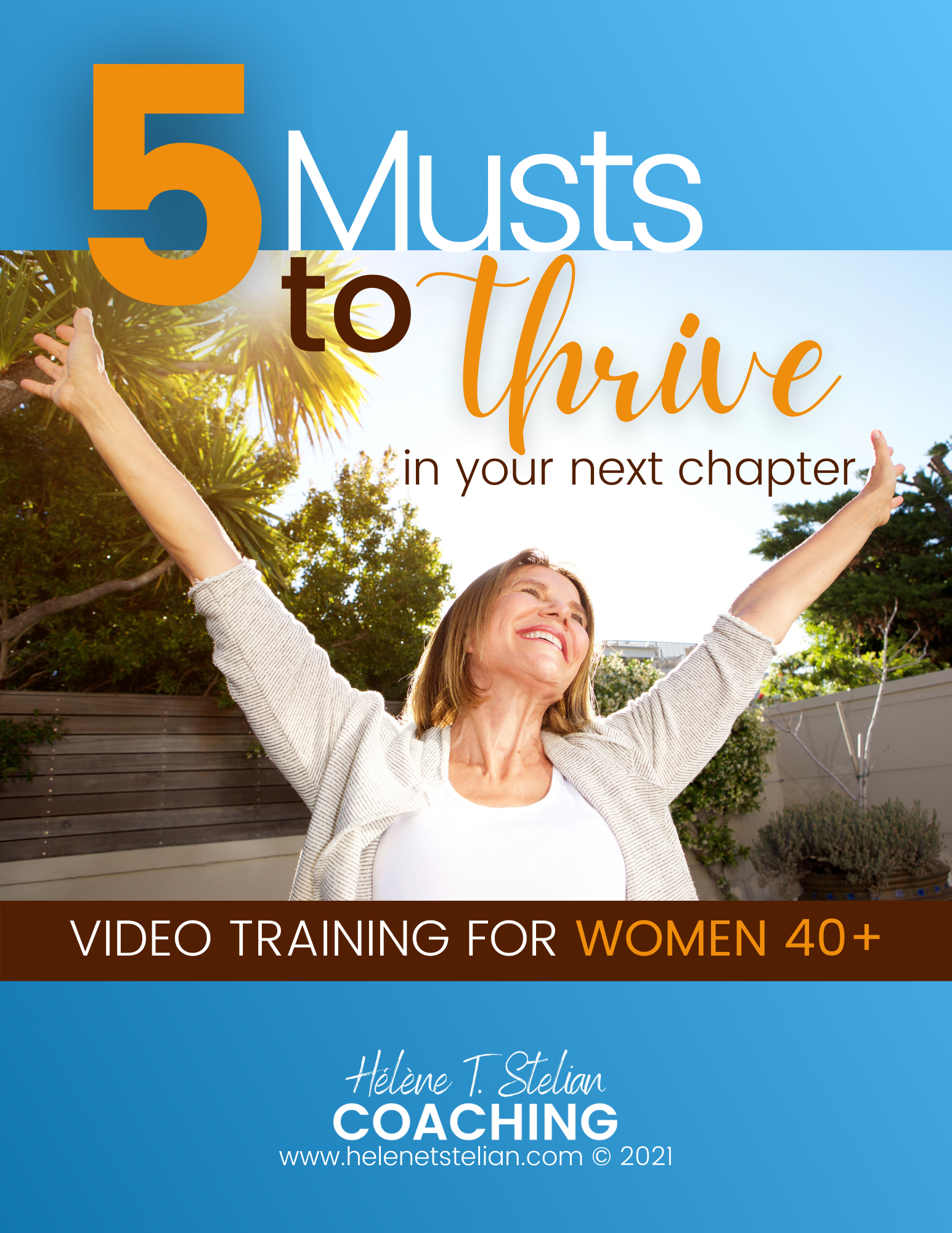



Marianne, Thank you for sharing your story with us! I love your determination and look forward to reading your new book.
Thanks for taking the time to read and respond, Vicki. You’ll be among the first to know when Swim Season is released.
bless your heart….I have just spent the past 5 days with my 93 yr. old father, who suffers with advanced dementia. He came to visit me so that he could see his 96 year old sister who was flying to Portland expressly to visit her only sibling. They had not seen each other for 10 years. After 2 hours of trying to be a good citizen, he took me aside and said, ” who is that old woman who talk too much?” The rest of our two day visit was full of anxiety and confusion.
I look forward to reading your book…and I commend you for your interest and courage in pursuing the subject of memory loss.
blessings to you and yours.
Marianne, thank you for your interest and courage in writing in such a hard topic as the one in memory loss. My grandmother has it and now she hardly has a blink to recognize her own relatives… I’m looking forward to reading your book. Good luch and inspiration to you!
I appreciate your taking the time to read and respond to my story. So sorry to hear about your grandmother. One of the hardest things in life is watching a loved one succumb to total memory loss. Remember: the memories in her heart never fade. Love big till the end and ever after. Blessings to you and your family.